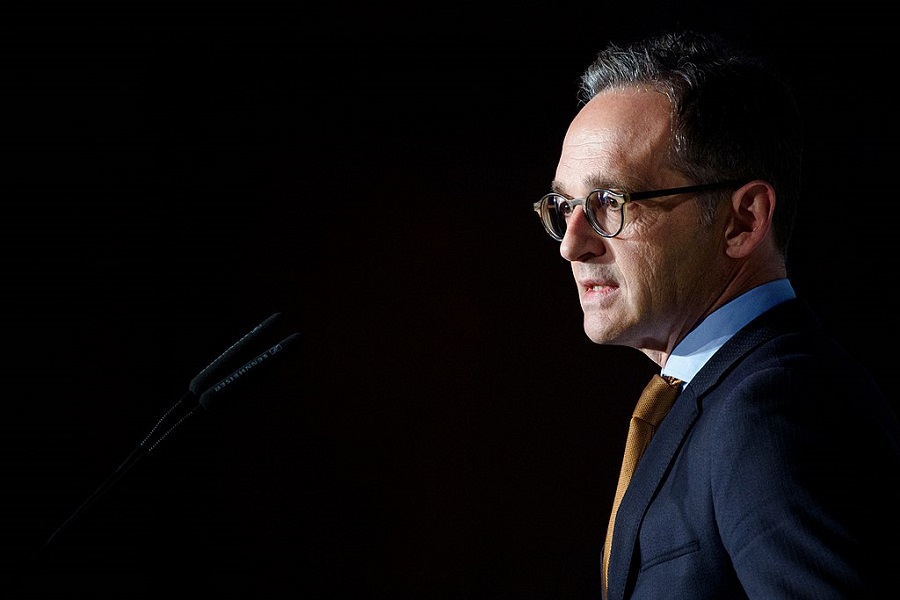Speech by Foreign Minister Heiko Maas to open the conference “Advocating Human Rights in the 21st Century”
______________________________________________________________________________________________________________________________________
“Progress is the realisation of Utopias.” So said Oscar Wilde, in a turn of phrase which sounds as though it could easily have been the motto of the 58 delegates who met in Paris 71 years ago today to adopt the Universal Declaration of Human Rights.
Three years after the end of the Second World War, in the light of colonialism, systematic racial discrimination and the oppression of women, they had to be able to believe in the power of Utopias. Otherwise, they would presumably not have been able to write a sentence like this:
“All human beings are born free and equal in dignity and rights.”
A sentence which has become so powerful that it has been translated into more than 500 languages and dialects. More than any other.
And yet one thing has not changed: for far too many people, all around the world, this sentence is still a Utopia.
How can we really talk about universal human rights
- as long as prisoners are being tortured to death in Syria?
- as long as thousands of women and children are being systematically raped in war and conflict?
What does it mean for the inalienability of human rights
- if women have to sell their body in order to get something to eat?
- if refugees across the world are being exploited as slave labour?
- if children are toiling down mines, not going to school?
And what about the indivisibility of human rights
- if women have equal rights on paper, but still earn less than men doing the same job?
- if journalists risk political persecution, and sometimes have to fear for their lives, merely for doing their job?
Ms Reyes,
I am especially pleased that you are here today and that your work is being rewarded with the Franco-German Prize for Human Rights and the Rule of Law.
Free, diverse and independent media are the essential cornerstone of any democratic society.
Throughout your career, you have worked to uphold independent, free and critical journalism. For that we wish to thank you.
Ladies and gentlemen,
Universal, indivisible and inalienable – we are a long way from those today.
Even worse, after decades of progress you get the impression today that we are moving farther and farther away from them.
So the fact that we are talking here in Berlin today about the future of human rights protection means one thing above all: stopping the current international rollback.
That will be one of our top priorities during Germany’s parallel membership from January of the Human Rights Council and the United Nations Security Council, as we pursue joint efforts there, for instance to combat impunity.
I have to tell you that I experienced this rollback myself when we adopted a resolution on the fight against sexual violence in conflict during our Security Council presidency in April.
It was shocking to see how, during weeks of negotiations, things were called into question that, as common sense would suggest, should actually be a matter of course.
Bringing perpetrators to justice more resolutely, for instance. Or at last giving survivors of sexual violence access to all kinds of medical help and advice, including on sexual and reproductive health and rights.
That experience showed me one thing in particular: it is not enough to fight just for the status quo. Because if you do that, you risk being pushed back step by step.
Ladies and gentlemen,
When it comes to standing up for an independent judiciary, as a fundamental prerequisite for guaranteeing human rights, fighting for them in court of law, sometimes it is enough to take a look around on the doorstep. You doubtless saw the demonstrations outside.
Buzzword “rollback”: even in countries which had developed advanced rule of law structures, we see that human rights need functioning rule of law – otherwise they cannot be defended.
For some years now, we have seen in Turkey how the judiciary certainly seems to be becoming dependent on the executive in some areas.
Ladies and gentlemen,
All of this shows us that progress on human rights does not happen simply of its own accord.
That is why we need a fresh approach, a joint effort by like-minded parties.
A new resolve not merely to defend human rights, but to expand and strengthen them. And for that we need more multilateral cooperation, not less! And for that we need a rules-based order.
That is why last year I and a few counterparts – many of whom I am delighted to see here today – launched the Alliance for Multilateralism.
Some 60 countries from all parts of the world are now participating in the Alliance. That shows that there is a great need to stand together and to work together. Because we realise that the major challenges of our time – the digital transformation, globalisation, migration, climate change – all have one thing in common, different as they are: none of them stops at national borders.
That is why it is impossible to find national solutions to them. On the contrary: there is no alternative to international cooperation!
Human rights protection must be a priority of our Alliance and of our cooperation. Because each of the challenges currently facing us ultimately has a huge impact on the human rights situation – worldwide!
That’s why we have deliberately chosen to focus here today on four issues of great importance for the future. With your help, we want to find answers and identify possible approaches for joint action.
1. The digital transformation
The digital transformation is probably the most sustainable issue, because it really does affect every single person in the world. And it will continue to do so. Also because it touches on every aspect of our lives: how we communicate, how we travel, how we shop, and much else besides.
Our life is increasingly determined by algorithms. But algorithms can only be as “intelligent” as the data fed into them.
If no security measures are built in, then existing forms of discrimination are more likely to be intensified.
On the basis of data gathered some years ago, for example, an algorithm would invite men rather than women for a job interview. Or categorise members of religious minorities as a security risk and have them detained.
However, things do not automatically improve if algorithms are used by the state – for surveillance operations, for instance, like we knew until recently only from films. Things like this have long become reality.
I am thinking, for example, of the reports that China monitors virtually every aspect of the lives of the just under 22 million citizens of Xinjiang province. So-called social scoring, a big brother state, aimed at putting the lid on criticism of the Government. This also means that over a million Uighurs are interned in camps in the province, thanks to algorithms.
Two poles are currently emerging in the digital world, ladies and gentlemen. One aims at repression. The other at profit maximisation.
Ladies and gentlemen,
If such are the two approaches we are currently having to deal with – profit maximisation on the one hand and repression on the other – then perhaps it is time for us in Europe to start thinking about a third possible approach.
Nowadays digital sovereignty can no longer be separated from foreign and security-policy sovereignty. And so that’s why we in the EU need to give real priority in the Multiannual Financial Framework to everything that has to do with digitalisation.
But digital sovereignty means more than this. We want to do more to protect the public from disinformation and online hate crime. That’s another topic we ought to be looking at.
And that, too, will be one of the priorities of our EU Council Presidency in the second half of next year, and also in the Council of Europe.
The EU has already proven quite impressively that it absolutely is possible to protect human rights in the digital era. With the hotly debated General Data Protection Regulation we were able to use Europe’s market power and ensure that human rights are valid both online and offline. And we were able to anchor the same key principle in our privacy resolution in the Human Rights Council. That is a course we will continue to pursue, a course we have to pursue.
2. Climate change
Climate change has long been more than just a purely environmental or economic problem; it is now also a security-policy issue. One that affects the human rights of millions. If the wars of the future are climate wars, if millions of people are forced to flee because drought or rising sea levels destroy their homelands, then climate change is a topic that belongs on the UN Security Council agenda.
We put this very issue on the Security Council agenda right at the start of our term, and we will continue to pursue it resolutely.
However, we are also focusing on the difficult situation faced by human rights defenders. Here we are primarily supporting the Norwegian initiative for a resolution, and as a signatory of the Geneva Pledge we want to ensure that the question of climate change is considered in the Human Rights Council next year.
3. Business and human rights
In the age of globalisation, companies bear an increasing responsibility for human rights protection, all across the world. For this reason, Germany has implemented the National Action Plan for Business and Human Rights continuously since 2016.
If the initial results of the monitoring are confirmed, we should look at the possibility of statutory regulations. Because that is the only way to create incentives for businesses to commit to respect for human rights. And at the same time it will provide a framework for flagging up those who do not.
However, it is not enough for one country to act alone. That is why this, too, will be a focus of our EU Presidency next year.
We are also working closely with the new Commission. We would like an Action Plan, so as to combine our common European policy for responsible corporate governance in a coherent manner. That, too, is necessary.
4. Women’s rights
I mentioned at the outset the difficulties you can encounter on this issue even in the UN Security Council. And I expect we will have the chance to talk more about this shortly in our panel discussion.
But perhaps I can start with this food for thought: Next year we will be celebrating the 25th anniversary of the World Conference of Women in Peking and the 20th anniversary of Resolution 1325 on Women, Peace and Security. We must use the momentum provided by these important anniversaries to advance women’s rights.
It is simply not enough merely to defend the status quo: we must work together to push the agenda on.
To that end, we are also stepping up cooperation with civil society, supporting women’s networks in Africa and Latin America, and indeed even setting one up in Latin America.
Gender equality is far from established. It is a matter of sense to advance it further.
Ladies and gentlemen,
Utopia will remain Utopian if everyone says it is “merely” Utopia.
For me and for all of us here today, the sentence “All human beings are born free and equal in dignity and rights” is not “merely” Utopia. It is a goal. A guiding principle for our political activity. Something worth fighting for. And that is why I am especially pleased that we are here today to look for ways to achieve this goal.
Thank you – and once again a very warm welcome to you all!
* * * * *
Zdroj: https://www.auswaertiges-amt.de/en/newsroom/news/maas-advocating-human-rights/2287352







